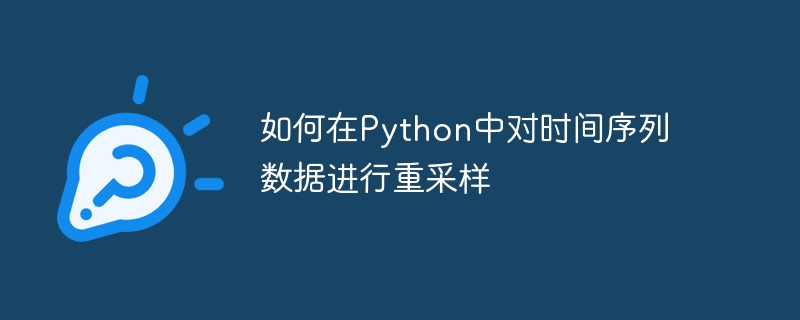如何在Python中对时间序列数据进行重采样

时间序列数据是在固定时间间隔内收集的观测序列。这些数据可以来自于任何领域,如金融、经济、健康和环境科学。我们收集的时间序列数据有时可能具有不同的频率或分辨率,这可能不适合我们的分析和数据建模过程。在这种情况下,我们可以通过上采样或下采样来重新采样时间序列数据,从而改变时间序列的频率或分辨率。本文将介绍不同的方法来上采样或下采样时间序列数据。
Upsampling
Upsampling means increasing the frequency of the time series data. This is usually done when we need a higher resolution or more frequent observations. Python provides several methods for upsampling time series data, including linear interpolation, nearest neighbor interpolation, and polynomial interpolation.
Syntax
DataFrame.resample(rule, *args, **kwargs) DataFrame.asfreq(freq, method=None) DataFrame.interpolate(method='linear', axis=0, limit=None, inplace=False, limit_direction='forward', limit_area=None)
在这里,
The resample function is a method provided by the pandas library to resample time series data. It is applied on a DataFrame and takes the rule parameter, which specifies the desired frequency for resampling. Additional arguments (*args) and keyword arguments (**kwargs) can be provided to customize the resampling behavior, such as specifying the aggregation method or handling missing values.
The asfreq method is used in conjunction with the resample function to convert the frequency of the time series data. It takes the freq parameter, which specifies the desired frequency string for the output. The optional method parameter allows specifying how to handle any missing values introduced during the resampling process, such as forward filling, backward filling, or interpolation.
插值方法用于填充时间序列数据中的缺失值或间隙。它根据指定的方法(例如'linear'、'nearest'、'spline')进行插值,以估计现有观测值之间的值。额外的参数可以控制插值的轴,连续NaN值的填充限制,以及是否在原地修改DataFrame或返回一个新的DataFrame。
线性插值
线性插值用于上采样时间序列数据。它通过在数据点之间绘制直线来填充间隙。可以使用pandas库中的resample函数实现线性插值。
Example
的中文翻译为:示例
In the below example, we have a time series DataFrame with three observations on non−consecutive dates. We convert the 'Date' column to a datetime format and set it as the index. The resample function is used to upsample the data to a daily frequency ('D') using the asfreq method. Finally, the interpolate method with the 'linear' option fills the gaps between the data points using linear interpolation. The DataFrame, df_upsampled, contains the upsampled time series data with interpolated values.
import pandas as pd
# Create a sample time series DataFrame
data = {'Date': ['2023-06-01', '2023-06-03', '2023-06-06'],
'Value': [10, 20, 30]}
df = pd.DataFrame(data)
df['Date'] = pd.to_datetime(df['Date'])
df.set_index('Date', inplace=True)
# Upsample the data using linear interpolation
df_upsampled = df.resample('D').asfreq().interpolate(method='linear')
# Print the upsampled DataFrame
print(df_upsampled)
输出
Value Date 2023-06-01 10.000000 2023-06-02 15.000000 2023-06-03 20.000000 2023-06-04 23.333333 2023-06-05 26.666667 2023-06-06 30.000000
最近邻插值
Nearest neighbor interpolation is a simple method that fills the gaps between data points with the nearest available observation. This method can be useful when the time series exhibits abrupt changes or when the order of observations matters. The interpolate method in pandas can be used with the 'nearest' option to perform nearest neighbor interpolation.
Example
的中文翻译为:示例
In the above example, we use the same original DataFrame as before. After resampling with the 'D' frequency, the interpolate method with the 'nearest' option fills the gaps by copying the nearest available observation. The resulting DataFrame, df_upsampled, now has a daily frequency with the nearest neighbor interpolation.
import pandas as pd
# Create a sample time series DataFrame
data = {'Date': ['2023-06-01', '2023-06-03', '2023-06-06'],
'Value': [10, 20, 30]}
df = pd.DataFrame(data)
df['Date'] = pd.to_datetime(df['Date'])
df.set_index('Date', inplace=True)
# Upsample the data using nearest neighbor interpolation
df_upsampled = df.resample('D').asfreq().interpolate(method='nearest')
# Print the upsampled DataFrame
print(df_upsampled)
输出
Value Date 2023-06-01 10.0 2023-06-02 10.0 2023-06-03 20.0 2023-06-04 20.0 2023-06-05 30.0 2023-06-06 30.0
下采样
降采样用于降低时间序列数据的频率,通常用于获得数据的更广泛视图或简化分析。Python提供了不同的降采样技术,例如在指定的时间间隔内取均值、求和或最大值。
Syntax
DataFrame.mean(axis=None, skipna=None, level=None, numeric_only=None, **kwargs)
在这里,聚合方法,如均值、和或最大值,在重新采样后应用于计算代表每个重新采样间隔内分组观测的单个值。这些方法通常在降采样数据时使用。它们可以直接应用于重新采样的DataFrame,也可以与重新采样函数结合使用,根据特定的频率(如每周或每月),通过指定适当的规则来聚合数据。
Mean Downsampling
的中文翻译为:平均下采样
均值降采样计算每个间隔内数据点的平均值。这种方法在处理高频数据并获得每个间隔的代表性值时非常有用。可以使用resample函数结合mean方法来执行均值降采样。
Example
的中文翻译为:示例
In the below example, we start with a daily time series DataFrame spanning the entire month of June 2023. The resample function with the 'W' frequency downsamples the data to weekly intervals. By applying the mean method, we obtain the average value within each week. The resulting DataFrame, df_downsampled, contains the mean-downsampled time series data.
import pandas as pd
# Create a sample time series DataFrame with daily frequency
data = {'Date': pd.date_range(start='2023-06-01', end='2023-06-30', freq='D'),
'Value': range(30)}
df = pd.DataFrame(data)
df.set_index('Date', inplace=True)
# Downsampling using mean
df_downsampled = df.resample('W').mean()
# Print the downsampled DataFrame
print(df_downsampled)
输出
Value Date 2023-06-04 1.5 2023-06-11 7.0 2023-06-18 14.0 2023-06-25 21.0 2023-07-02 27.0
Maximum Downsampling
最大降采样计算并设置每个间隔内的最高值。此方法适用于识别时间序列中的峰值或极端事件。在前面的示例中使用max而不是mean或sum允许我们执行最大降采样。
Example
的中文翻译为:示例
In the below example, we start with a daily time series DataFrame spanning the entire month of June 2023. The resample function with the 'W' frequency downsamples the data to weekly intervals. By applying the max method, we obtain the Maximum value within each week. The resulting DataFrame, df_downsampled, contains the maximum-downsampled time series data.
import pandas as pd
# Create a sample time series DataFrame with daily frequency
data = {'Date': pd.date_range(start='2023-06-01', end='2023-06-30', freq='D'),
'Value': range(30)}
df = pd.DataFrame(data)
df.set_index('Date', inplace=True)
# Downsampling using mean
df_downsampled = df.resample('W').max()
# Print the downsampled DataFrame
print(df_downsampled)
输出
Value Date 2023-06-04 3 2023-06-11 10 2023-06-18 17 2023-06-25 24 2023-07-02 29
结论
在本文中,我们讨论了如何使用Python对时间序列数据进行重新采样。Python提供了各种上采样和下采样技术。我们探讨了线性和最近邻插值用于上采样,以及均值和最大值插值用于下采样。您可以根据手头的问题使用任何一种上采样或下采样技术。
以上是如何在Python中对时间序列数据进行重采样的详细内容。更多信息请关注PHP中文网其他相关文章!

热AI工具

Undresser.AI Undress
人工智能驱动的应用程序,用于创建逼真的裸体照片

AI Clothes Remover
用于从照片中去除衣服的在线人工智能工具。

Undress AI Tool
免费脱衣服图片

Clothoff.io
AI脱衣机

Video Face Swap
使用我们完全免费的人工智能换脸工具轻松在任何视频中换脸!

热门文章

热工具

记事本++7.3.1
好用且免费的代码编辑器

SublimeText3汉化版
中文版,非常好用

禅工作室 13.0.1
功能强大的PHP集成开发环境

Dreamweaver CS6
视觉化网页开发工具

SublimeText3 Mac版
神级代码编辑软件(SublimeText3)

热门话题
 PHP和Python:解释了不同的范例
Apr 18, 2025 am 12:26 AM
PHP和Python:解释了不同的范例
Apr 18, 2025 am 12:26 AM
PHP主要是过程式编程,但也支持面向对象编程(OOP);Python支持多种范式,包括OOP、函数式和过程式编程。PHP适合web开发,Python适用于多种应用,如数据分析和机器学习。
 在PHP和Python之间进行选择:指南
Apr 18, 2025 am 12:24 AM
在PHP和Python之间进行选择:指南
Apr 18, 2025 am 12:24 AM
PHP适合网页开发和快速原型开发,Python适用于数据科学和机器学习。1.PHP用于动态网页开发,语法简单,适合快速开发。2.Python语法简洁,适用于多领域,库生态系统强大。
 visual studio code 可以用于 python 吗
Apr 15, 2025 pm 08:18 PM
visual studio code 可以用于 python 吗
Apr 15, 2025 pm 08:18 PM
VS Code 可用于编写 Python,并提供许多功能,使其成为开发 Python 应用程序的理想工具。它允许用户:安装 Python 扩展,以获得代码补全、语法高亮和调试等功能。使用调试器逐步跟踪代码,查找和修复错误。集成 Git,进行版本控制。使用代码格式化工具,保持代码一致性。使用 Linting 工具,提前发现潜在问题。
 vs code 可以在 Windows 8 中运行吗
Apr 15, 2025 pm 07:24 PM
vs code 可以在 Windows 8 中运行吗
Apr 15, 2025 pm 07:24 PM
VS Code可以在Windows 8上运行,但体验可能不佳。首先确保系统已更新到最新补丁,然后下载与系统架构匹配的VS Code安装包,按照提示安装。安装后,注意某些扩展程序可能与Windows 8不兼容,需要寻找替代扩展或在虚拟机中使用更新的Windows系统。安装必要的扩展,检查是否正常工作。尽管VS Code在Windows 8上可行,但建议升级到更新的Windows系统以获得更好的开发体验和安全保障。
 vscode 扩展是否是恶意的
Apr 15, 2025 pm 07:57 PM
vscode 扩展是否是恶意的
Apr 15, 2025 pm 07:57 PM
VS Code 扩展存在恶意风险,例如隐藏恶意代码、利用漏洞、伪装成合法扩展。识别恶意扩展的方法包括:检查发布者、阅读评论、检查代码、谨慎安装。安全措施还包括:安全意识、良好习惯、定期更新和杀毒软件。
 Python vs. JavaScript:学习曲线和易用性
Apr 16, 2025 am 12:12 AM
Python vs. JavaScript:学习曲线和易用性
Apr 16, 2025 am 12:12 AM
Python更适合初学者,学习曲线平缓,语法简洁;JavaScript适合前端开发,学习曲线较陡,语法灵活。1.Python语法直观,适用于数据科学和后端开发。2.JavaScript灵活,广泛用于前端和服务器端编程。
 PHP和Python:深入了解他们的历史
Apr 18, 2025 am 12:25 AM
PHP和Python:深入了解他们的历史
Apr 18, 2025 am 12:25 AM
PHP起源于1994年,由RasmusLerdorf开发,最初用于跟踪网站访问者,逐渐演变为服务器端脚本语言,广泛应用于网页开发。Python由GuidovanRossum于1980年代末开发,1991年首次发布,强调代码可读性和简洁性,适用于科学计算、数据分析等领域。
 vscode怎么在终端运行程序
Apr 15, 2025 pm 06:42 PM
vscode怎么在终端运行程序
Apr 15, 2025 pm 06:42 PM
在 VS Code 中,可以通过以下步骤在终端运行程序:准备代码和打开集成终端确保代码目录与终端工作目录一致根据编程语言选择运行命令(如 Python 的 python your_file_name.py)检查是否成功运行并解决错误利用调试器提升调试效率






